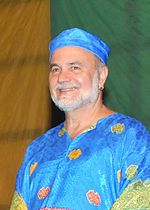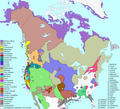Trumai is an endangered language isolate of Brazil. Most Trumai are fluent in languages of wider communication, and children are not learning it well... 30 KB (3,771 words) - 20:40, 25 May 2023 |
Trumai may refer to: Trumai people, an ethnic group of Brazil Trumai language, their language This disambiguation page lists articles associated with... 190 bytes (46 words) - 13:00, 25 May 2021 |
The Trumai (or Trumaí; native name: Ho kod ke) are an indigenous people of Brazil. They currently reside within the Xingu Indigenous Park, in the state... 4 KB (377 words) - 22:56, 9 October 2023 |
 | List of Indigenous peoples of Brazil (category Articles containing Portuguese-language text) Jan 2013. "Tremembé." Povos indígenas do Brasil. Retrieved 31 Jul 2022. "Trumai: Introduction." Povos Indígenas no Brasil. Retrieved 24 Feb 2012. Table... 42 KB (497 words) - 00:44, 17 December 2023 |
linking three small language families of the Amazon: The Harákmbut (Tuyoneri) family, the extinct Otomakoan languages, and the Trumai language isolate. It was... 1 KB (107 words) - 23:52, 15 March 2020 |
An endangered language is a language that it is at risk of falling out of use, generally because it has few surviving speakers. If it loses all of its... 26 KB (85 words) - 02:47, 12 March 2024 |
Consciously devised language Endangered language – Language that is at risk of going extinct Ethnologue#Language families Extinct language – Language that no longer... 34 KB (217 words) - 13:32, 22 April 2024 |
 | The indigenous languages of South America are those whose origin dates back to the pre-Columbian era. The subcontinent has great linguistic diversity... 62 KB (4,809 words) - 10:48, 8 February 2024 |
 | Kalapalo, Kamaiurá, Kayapó, Kuikuro, Matipu, Mehinako, Nahukuá, Suyá, Trumai, Wauja and Yawalapiti. The different tribes comprising the Xingu have not... 12 KB (1,392 words) - 13:03, 30 March 2024 |
is exceptionally rare. Only a few Native American languages, mostly language isolates (Haida, Trumai, Wappo) and the Oto-Manguean family are known for... 46 KB (5,855 words) - 15:51, 11 April 2024 |
 | Guahibo-Pamigua, Saliban, Otomaco-Taparita, Mocoa, Tuyuneri, Yuruneri, Trumai, Cayuvava Ge-Pano-Carib Macro-Gê Ge, Caingang, Camacan, Machacali, Puri... 25 KB (1,699 words) - 23:11, 26 January 2024 |
 | A language isolate is a language that has no demonstrable genetic relationship with another language. Basque in Europe, Ainu in Asia, Sandawe in Africa... 69 KB (4,407 words) - 14:49, 25 April 2024 |
Xingu Indigenous Park (category Articles with Portuguese-language sources (pt)) are: Trumai Jê languages Suyá Tupian languages Juruna (Yudja) Kayabi Cariban languages Ikpeng (Txikão) In the northern park of the park, only Trumai has... 15 KB (1,719 words) - 16:25, 28 January 2024 |
 | Cofán Esmeralda Jivaro Kandoshi Yaruro Kariri–Tupi Piaroa Taruma Timote Trumai Tusha Yuracaré Zamuco Macro-Tucanoan Auixiri Canichana Capixana Catuquina... 29 KB (2,444 words) - 21:33, 9 April 2024 |
Chaco linguistic area (redirect from Chaco languages) Macro-Mataguayo-Guaykuru languages and Tupi-Guarani languages suggest that Trumai had originated in the Paraguay River basin. The Trumai had only arrived in... 5 KB (448 words) - 01:14, 8 January 2024 |
 | Tukuna) Timotean (2) † Tiniguan (2) (also known as Tiníwan, Pamiguan) † Trumai (Brazil: Xingu, Mato Grosso) Tucanoan (15) Tupian (70, including Guaraní)... 108 KB (6,980 words) - 01:56, 23 April 2024 |
Causative (category Articles with German-language sources (de)) becoming the object O. All languages have ways to express causation but differ in the means. Most, if not all, languages have specific or lexical causative... 66 KB (8,513 words) - 10:07, 25 March 2024 |
List of contemporary ethnic groups (category CS1 Turkish-language sources (tr)) group tends to be associated with shared ancestry, history, homeland, language or dialect and cultural heritage; where the term "culture" specifically... 396 KB (3,590 words) - 17:29, 22 April 2024 |
(Mocochí; Mirripú) Tiniguan † Tinigua (Timigua) Pamigua (Pamiwa) † Trumai (Trumaí, Tramalhy) Tukanoan (Tucanoan) Western Tukanoan Coreguaje (Koreguaje... 190 KB (4,385 words) - 07:43, 23 November 2023 |
Glottolog (category Language families) of the world's languages. In addition to listing linguistic materials (grammars, articles, dictionaries) describing individual languages, the database... 31 KB (668 words) - 07:42, 18 March 2024 |
 | Pre-Cabraline history of Brazil (category CS1 Brazilian Portuguese-language sources (pt-br)) factor is that much remains to be done at various levels of research - language records and comparisons, analysis of excavated materials, the relationship... 67 KB (7,644 words) - 04:19, 22 April 2024 |
 | Luiz Mott (category CS1 Brazilian Portuguese-language sources (pt-br)) desire in a number of indigenous Brazilian tribes such as the Bororo, Guató, Trumai, Tupinambá, Wai Wai and Xavante. He has also explored intimate partner violence... 6 KB (597 words) - 03:46, 16 April 2024 |








